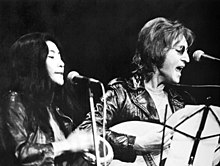During the year, Lennon and Ono began to support efforts by the family of James Hanratty to prove his innocence. Hanratty had been hanged in 1962. According to Lennon, those who had condemned Hanratty were "the same people who are running guns to South Africa and killing blacks in the streets ... The same bastards are in control, the same people are running everything, it's the whole bullshit bourgeois scene." In London, Lennon and Ono staged a "Britain Murdered Hanratty" banner march and a "Silent Protest For James Hanratty", and produced a 40-minute documentary on the case. At an appeal hearing more than thirty years later, Hanratty's conviction was upheld after DNA evidence was found to match.
Lennon and Ono showed their solidarity with the Clydeside UCS workers' work-in of 1971 by sending a bouquet of red roses and a cheque for £5,000. On moving to New York City in August that year, they befriended two of the Chicago Seven, Yippie peace activists Jerry Rubin and Abbie Hoffman. Another political activist, John Sinclair, poet and co-founder of the White Panther Party, was serving ten years in prison for selling two joints of marijuana after previous convictions for possession of the drug. In December 1971 at Ann Arbor, Michigan, 15,000 people attended the "John Sinclair Freedom Rally", a protest and benefit concert with contributions from Lennon, Stevie Wonder, Bob Seger, Bobby Seale of the Black Panther Party, and others. Lennon and Ono, backed by David Peel and Jerry Rubin, performed an acoustic set of four songs from their forthcoming Some Time in New York City album including "John Sinclair", whose lyrics called for his release. The day before the rally, the Michigan Senate passed a bill that significantly reduced the penalties for possession of marijuana and four days later Sinclair was released on an appeal bond. The performance was recorded and two of the tracks later appeared on John Lennon Anthology (1998).

Niciun comentariu:
Trimiteți un comentariu